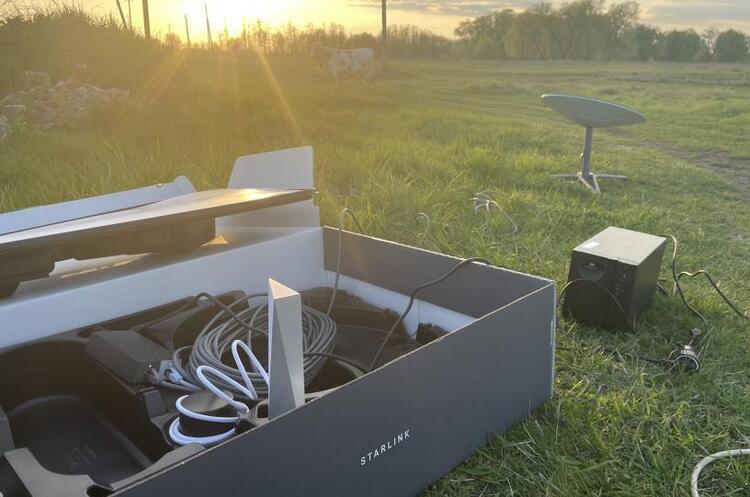Russian military starts using Elon Musk's internet in Ukraine
The equipment is supplied from Dubai, and it is imported "literally in tonnes"

The Armed Forces of Ukraine continue to use Elon Musk's Starlink satellite internet services, which are now provided under a contract with the Pentagon. But recently, Russian troops operating in the occupied territories have also started to use this connection. The connection works there because Starlink provides coverage within the internationally recognised borders of Ukraine.
The information about the appearance of Starlink there was shared by Ukrainian TV presenter, journalist and writer Andriy Tsaplienko, Newsweek reports.
Tsaplienko cited reports from soldiers on the front line that "the occupiers have Starlink with licensed accounts".
"Starlink has been massively supplied to Russia via Dubai, accounts are activated and working in the occupied territories," one soldier wrote.
Another notes that Ukrainian soldiers "can already see their [Russian] Starlink", adding: "To be honest, I thought they would do it earlier."
A specialised Russian media outlet, ComNews, also reported on the supply of working systems to the war zone:
"More than 10 Russian online stores have started selling Starlink subscriber receiving equipment." Unlike last year's single sales of unactivated devices, "this time deliveries to Russia are on a wholesale scale" and with activated accounts:
"The Starlink network does not work in Russia, but its signal is available in the occupied territories and Crimea. Merchants do not hide the fact that Starlink kits are addressed to members of the military and are sold out in large quantities."
The website of the Top Machines store explicitly states: "STARLINK for sale for the AFU from 220 thousand rubles, with a personal account. Assistance in connection, sale of adapters, wires, creation of accounts for Starlink satellite internet".
The equipment is supplied from Dubai, and it is imported "literally by the tonne", a satellite market participant told ComNews:
"Before being imported into Russia, the terminals are massively registered to various foreign companies (often Cyprus), and then an account is activated under any name, often fictitious."
According to the manager of a company that supplies telecommunications equipment to the military, the Russian army has a ban on Starlink, so only volunteer units use it:
"These units are not documented in any way, but there are a lot of them. Sellers of Starlink equipment do not know where to look for them, and this has led to such a massive public offer of Starlink kits in online stores."
"Ukrayinska Pravda notes that Ukrainian soldiers' Starlink speeds reportedly drop to 0.1 megabits per second, "a thousand times less than promised," while Russians have no problems. The map on Starlink's website does show that the Russian-occupied parts of Kherson and Zaporizhzhia (but not Donetsk and Luhansk) regions fall within the service area.
Starlink can be used for both civilian and military purposes.
"The supply of Starlink through an intermediary in Dubai should be considered a violation of sanctions against Russia," Newsweek quoted Pekka Kallioniemi, a researcher at the University of Tampere in Finland, as saying.
Musk's SpaceX company said that SpaceX does not cooperate with the Russian government and armed forces in any way, has never supplied Starlink equipment to Russia and does not provide communications there. Starlink is also not supplied to Dubai, and none of the intermediaries or distributors have the rights to do so.
"If SpaceX learns that a Starlink terminal is being used by someone who is not authorised or sanctioned, we will investigate and, if confirmed, take action to deactivate the terminal," the company said.
A Pentagon spokesperson told Newsweek that the department was aware of Starlink's supply to the occupied territories of Ukraine, but would not make a statement: "I recommend that you contact our Ukrainian partners for more information on such satellite communications."
Background. Earlier it became known that Israel threatened to break off relations with Starlink over the conflict with Elon Musk.
If you have read this article to the end, we hope that means it was useful for you.
We work to ensure that our journalistic and analytical work is of high quality, and we strive to perform it as competently as possible. This also requires financial independence. Support us for only UAH 196 per month.
Become a Mind subscriber for just USD 5 per month and support the development of independent business journalism!
You can unsubscribe at any time in your LIQPAY account or by sending us an email: [email protected]



